PICTURED: A sandstorm rolls into the Al-Asad air base, Iraq.
WASHINGTON. March 31st, 2019. With over 200 military bases in over 100 countries, it was only a matter of time until COVID-19 began to make its mark on the United States military empire. On Tuesday, 500 troops were ordered home from Afghanistan 60 days earlier than they were slated to return due to an “accelerated schedule from the coronavirus,” according to a Newsweek report.
This news came one day after the military registered its first death from COVID-19, a captain in the New Jersey National Guard.
The captain’s death could be the last that people hear about, as it was announced that very day by the pentagon that numbers of cases in the military would not be released to the public.
“As we continue to grapple with the novel nature of COVID19, we are constantly assessing and adapting not only how we respond to combatting the virus, but also how we share critical public health information with our communities,” Pentagon spokeswoman Alyssa Farah said in a statement on Monday.
At the time of the statement, 569 active-duty service members had been infected with coronavirus, as well as 220 civilian personnel, 64 contractors, and 190 family members.
War and plague
Docked currently at Guam, the USS Theodore Roosevelt, an aircraft carrier and part of the Pacific fleet is currently dealing with the nightmare situation of an outbreak aboard the floating fortress of 4,000 crew members.
“We are not at war,” wrote Brett Crozier, captain of the Teddy in a letter to Naval Command that was reported on by the San Francisco Chronicle.
“Sailors do not need to die. If we do not act now, we are we are failing to properly take care of our most trusted assets – our sailors”.
While it has seemed that neither voter interest, nor international law would ever put a stop to the expansionary nature of U.S. foreign policy and militarism after the First Gulf War, this novel coronavirus might but a damper on the U.S. military’s many missions abroad.
Since outbreaks of COVID-19 have been the worst, thus far, in developed nations like the EU, China, Korea, and the United States, it’s only a matter of time until it trickles it’s way out to nations whose healthcare systems are much-less capable of containing the virus that seems to be nearly unstoppable.
With cases reported in 97 domestic bases in 37 states, it would seem difficult to keep it off-base near home; and with military bases in 53 of the 54 countries of Africa, more than 34 in Germany alone, and many many more across the world, it could be other military leaders parroting Capt. Crozier’s words of unnecessary casualties in the near future.
PICTURED: A map of the permanent military bases in Iraq circa 2007 when troop levels were much higher. Photo credit: Yan J. CC 3.0.
A worried force
William Arkin, author of a half-dozen books on nuclear weapons and the new book Ending Perpetual War, details in a piece for Newsweek the gravity of the situation.
“It is a worried force, as worried as I’ve ever seen it, and not just because coronavirus is global and knows no boundaries,” Arkin writes. “But also because the future, including their future, is so uncertain”.
“I can’t believe that post-coronavirus we will just return to our steady state,” a senior officer in the brigade of 500 troops due back early on the conditions of anonymity told Arkin.
In Iraq, where tensions are still high after American soldiers were recently killed during a rocket strike, doctors are beginning to warn about complete and total medical collapses if case numbers continue to rise.
Iraq is home to the largest U.S. embassy complex on earth as well as 7 major military bases, with 5,500 forces stationed in the country that have been ordered to evacuate the sovereign Middle-Eastern nation by a unanimous vote in the Iraqi parliament.
A soldier died recently, the 6th this year, as part of a non-combat related incident which according to the Military Times, wasn’t related to COVID-19. Still, as families of service members feel their loved one’s absence now more than ever, and as the power of U.S. military personnel and firepower, so called “hard assets” to influence countries like Iraq or Afghanistan diminishes, the value and import of these continuing engagements for the U.S. citizen, as well as the U.S. servicemen, is likely to do the same.
Such conflicts seem all the less-important when the costs are examined – the nuclear program spending for the U.S. military in one year for instance could purchase 300,000 ICU beds, 35,000 ventilators, which U.S. hospitals seem to be dreadfully short of, and provide the salaries for 75,000 doctors.




